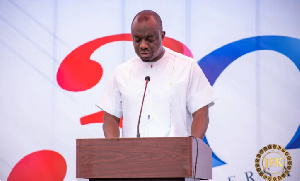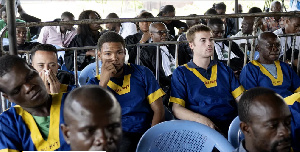Business News of Thursday, 7 April 2022
Source: GNA
LEAP: Government to pay 2021 arrears in weeks
Mr Myles Ongoh, Assistant Director, Livelihood Empowerment Against Poverty (LEAP) Programme, says the government is working to pay two cycles of the 2021 arrears for LEAP beneficiaries in weeks.
The arrears, which had been delayed, will still take a few weeks to clear because banks and other actors will have to prepare and beneficiaries informed to prepare for receipt.
LEAP is a cash transfer programme introduced by the Government of Ghana in 2008 for extremely poor and vulnerable households.
Beneficiaries are orphaned and vulnerable children, persons with severe disabilities without any productive capacity, extremely poor pregnant women and lactating mothers, and poor elderly who are 65 years and above.
Mr Ongoh, in an interview with the Ghana News Agency, gave the assurance after the World Bank, under the Ghana Productive Safety Net Project 2, gave the Government of Ghana GHS42 million to pay two-cycle arrears (75th and 76th cycles) to the beneficiaries for September to December 2021.
The delay in payment was due to financial challenges worsened by the COVID-19 pandemic.
The government, he said, was also working feverishly to pay the 77th cycle (January and February 2022) arrears to ensure that beneficiaries were relieved of financial challenges.
“Within the next few weeks, we have received direction to make payments because these are people who are vulnerable and extremely poor, and the payments have already been delayed, so we, at the technical level, should not further delay the process. It could be paid earlier, but we are not to exceed the period we were given at all,” he added.
Mr Colson Akanbasiam, the Head of Communication, LEAP, explained that by contract, no beneficiary was expected to travel beyond three to five kilometres to receive the grant, therefore, financial institutions were required to move into communities to pay beneficiaries through their e-zwich accounts, except for those large communities with e-zwich-enabled financial institutions.
“Because if beneficiaries travel beyond five kilometres out of the already little amount on transportation, it will eat into the money,” he added.
Speaking on the current payments - GHS64.00, GHS76.00, GHS88.00 and GHS106.00 per month, given to beneficiaries, Mr Akanbasiam said although there were complaints of the amounts losing their value due to the economic dynamics fueled by inflation among other conditions, they were optimistic that something could be done about it going forward.
Speaking on how the government would make payments within the coming months after clearing the arrears in the current economic status, Mr Akanbasiam said: “Government is very committed to making sure beneficiaries receive their payments, all-cash grants due them. It is not resting until it does that.”











